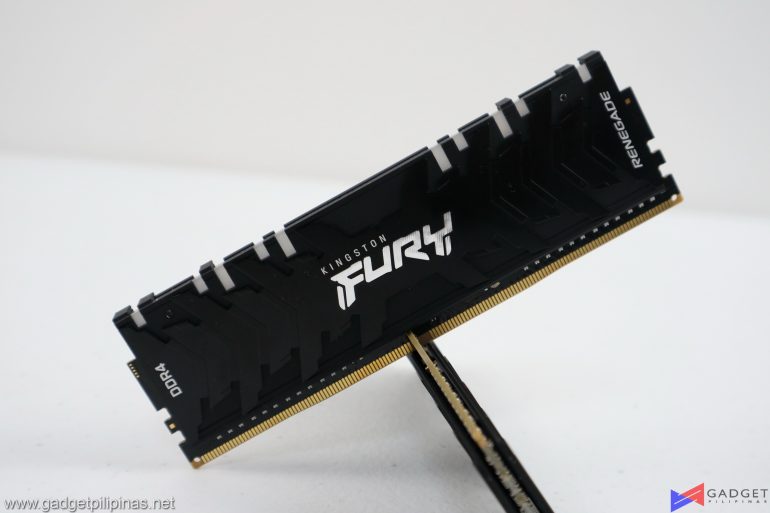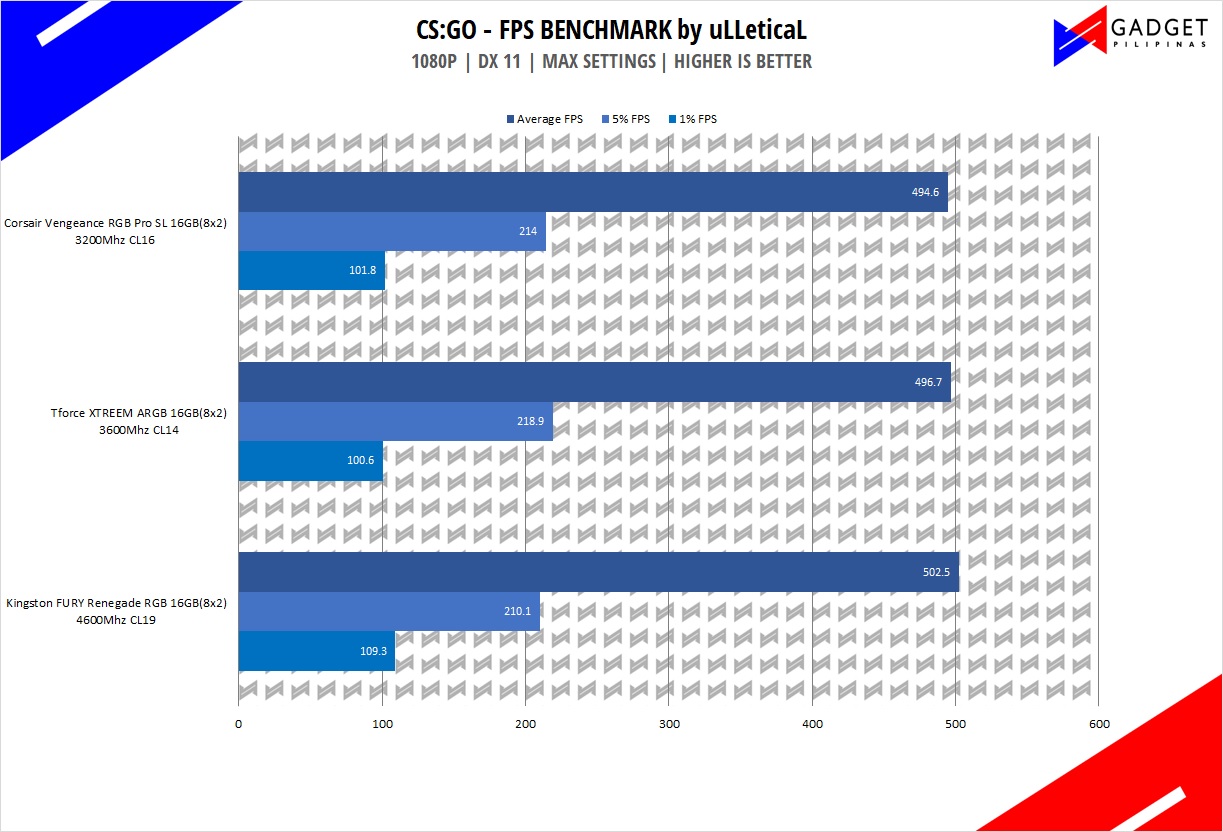Introduction
Earlier this year, it was announced that Kingston entered an agreement with HP Inc to sell the HyperX gaming division for $425 Million. The deal included the HyperX branding as well as Kingston HyperX’s entire peripheral lineup, leaving Kingston to retain its DRAM, flash, and SSD products for gamers and enthusiasts. As the deal recently came to a close, a lot of us were curious if Kingston were to retain the HyperX moniker for its gaming/enthusiast-oriented products or create a new gaming line. Well, it seems our questions are answered with the launch of Kingston’s first product since the acquisition, the Kingston FURY Renegade RGB DDR4 Memory.
Kingston FURY
 Kingston FURY is the brand’s next generation of performance memory and storage solutions geared for PC enthusiasts, gamers, and content creators. With a longstanding 19 years as a market leader, Kingston FURY has evolved from a product category to a full-fledged performance and enthusiasts gaming brand effectively replacing the HyperX banner which was sold off to HP Inc.
Kingston FURY is the brand’s next generation of performance memory and storage solutions geared for PC enthusiasts, gamers, and content creators. With a longstanding 19 years as a market leader, Kingston FURY has evolved from a product category to a full-fledged performance and enthusiasts gaming brand effectively replacing the HyperX banner which was sold off to HP Inc.
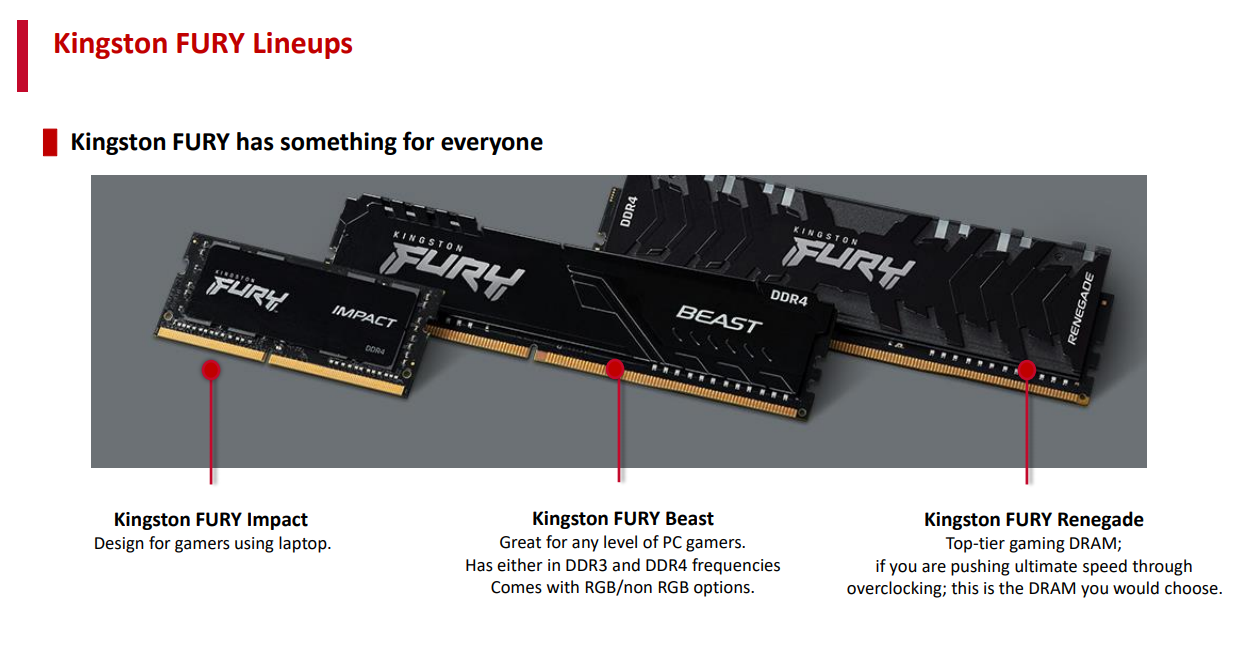 Kingston released three product categories for the first FURY memory gaming lineup. Kingston FURY Impact represents SODIMM DDR4 modules with kit sizes ranging from 16GB, 32GB, and 64GB and a max speed of 32,00 Mhz. Kingston FURY beast DDR4 memory modules come in black and RGB options with a maximum kit size of 128GB and speeds up to 3,733 Mhz. Finally, Kingston FURY Renegade which is the current flagship product for the DDR4 line comes with up to a 256GB kit size as well as speeds up to 4,600Mhz for the RGB variant and 5,333 Mhz for the non-RGB variants. In this review, we’ll be focusing on the Kingston FURY Renegade RGB 16GB (2x8GB) 4600Mhz kit.
Kingston released three product categories for the first FURY memory gaming lineup. Kingston FURY Impact represents SODIMM DDR4 modules with kit sizes ranging from 16GB, 32GB, and 64GB and a max speed of 32,00 Mhz. Kingston FURY beast DDR4 memory modules come in black and RGB options with a maximum kit size of 128GB and speeds up to 3,733 Mhz. Finally, Kingston FURY Renegade which is the current flagship product for the DDR4 line comes with up to a 256GB kit size as well as speeds up to 4,600Mhz for the RGB variant and 5,333 Mhz for the non-RGB variants. In this review, we’ll be focusing on the Kingston FURY Renegade RGB 16GB (2x8GB) 4600Mhz kit.
Kingston FURY Renegade RGB Specs
- Capacities
Singles: 8GB, 16GB, 32GB
Kit of 2: 16GB, 32GB, 64GB
Kit of 4: 32GB, 64GB, 128GB
Kit of 8: 256GB - Frequencies: 3000MHz, 3200MHz, 3600MHz, 4000MHz, 4266MHz, 4600MHz
- Latencies: CL15, CL16, CL17, CL18, CL19
- Voltage: 1.35V, 1.4V, 1.5V
- Operating Temperature: 0°C to 70°C
- Dimensions: 133.35mm x 42.2mm x 8mm
A Closer Look
- Kingston FURY Renegade RGB 16GB DDR4 4600Mhz Review 006
- Kingston FURY Renegade RGB 16GB DDR4 4600Mhz Review 006
- Kingston FURY Renegade RGB 16GB DDR4 4600Mhz Review 007
- Kingston FURY Renegade RGB 16GB DDR4 4600Mhz Review 007
Kingston went for a lighter design this time around with the Kingston FURY Renegade’s packaging. It follows the HyperX peripheral white-dominant packaging design as opposed to the HyperX Predator DDR4 packaging with a black design and red accents.
- Kingston FURY Renegade RGB 16GB DDR4 4600Mhz Review 014
- Kingston FURY Renegade RGB 16GB DDR4 4600Mhz Review 014
- Kingston FURY Renegade RGB 16GB DDR4 4600Mhz Review 016
- Kingston FURY Renegade RGB 16GB DDR4 4600Mhz Review 016
There’s not much inside the packaging aside from the FURY Renegade DDR4 modules, a quick start guide and a Kingston FURY sticker.
- Kingston FURY Renegade RGB 16GB DDR4 4600Mhz Review 021
- Kingston FURY Renegade RGB 16GB DDR4 4600Mhz Review 021
- Kingston FURY Renegade RGB 16GB DDR4 4600Mhz Review 033
- Kingston FURY Renegade RGB 16GB DDR4 4600Mhz Review 033
Design-wise, the Kingston FURY Renegade is identical to the HyperX Predator memory modules albeit with some slight modifications which we’ll talk about later.Each stick is a 1Rx8 with eight 1G x 8-bit FBGA components per module that supports Intel XMP 2.0. The Kingston FURY Renegade 16GB 4600 Mhz variant has two XMP profiles with the first one running at DDR4-4600 CL19-26-26 at 1.5v and the second profile running at a lower speed DDR4-4000 CL19-23-23 at 1.35v. For this review, our FURY Renegade 16GB Kit will run using the first XMP profile.
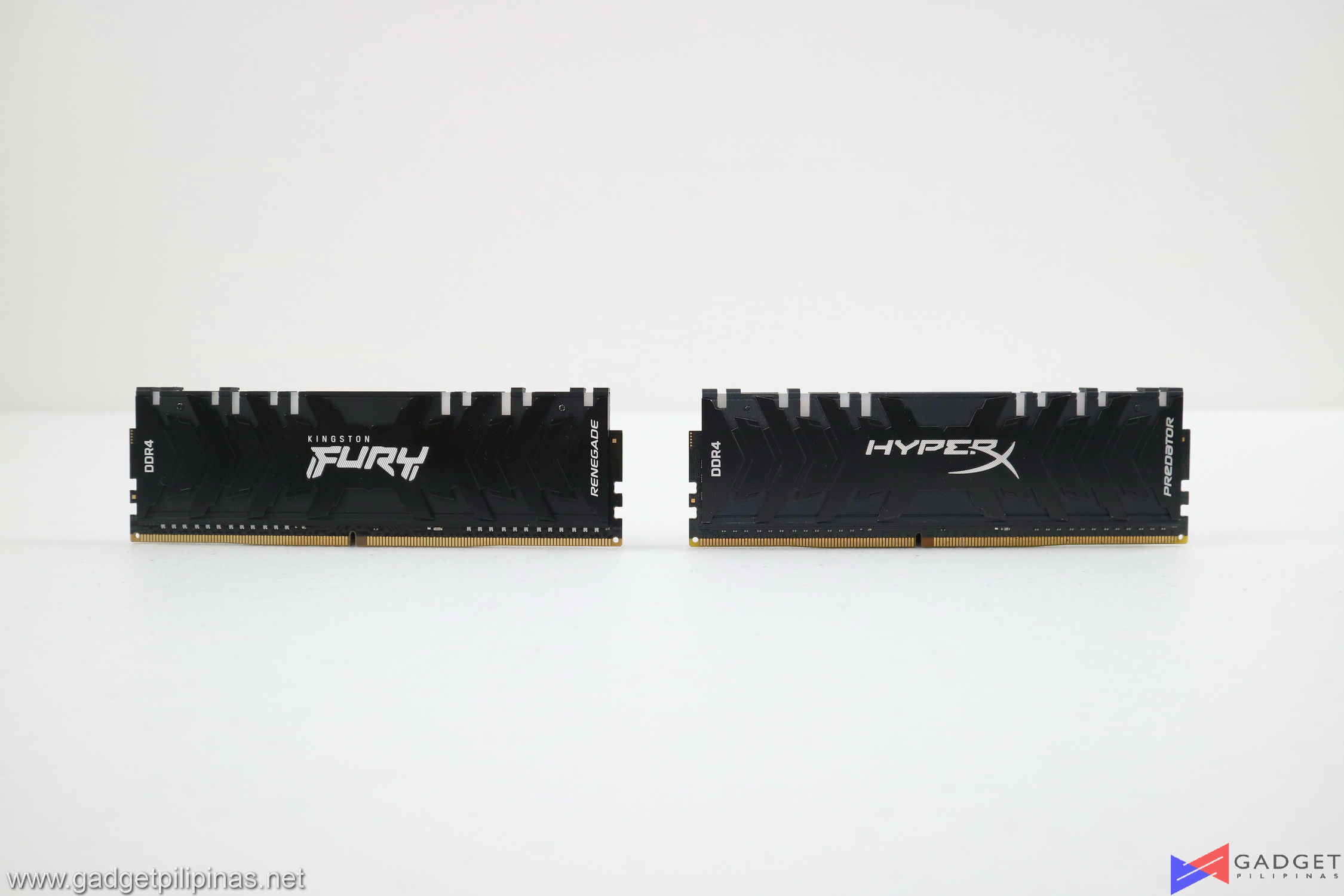 One could easily mistake which is which as the design of the FURY Renegade and HyperX Predator are identical with the exception of their respective logos. However, upon further inspection, we noticed that the Fury heat spreader has a darker tone compared to the Predator stick which makes it look slightly more premium especially when you noticed the design on the FURY logo.
One could easily mistake which is which as the design of the FURY Renegade and HyperX Predator are identical with the exception of their respective logos. However, upon further inspection, we noticed that the Fury heat spreader has a darker tone compared to the Predator stick which makes it look slightly more premium especially when you noticed the design on the FURY logo.
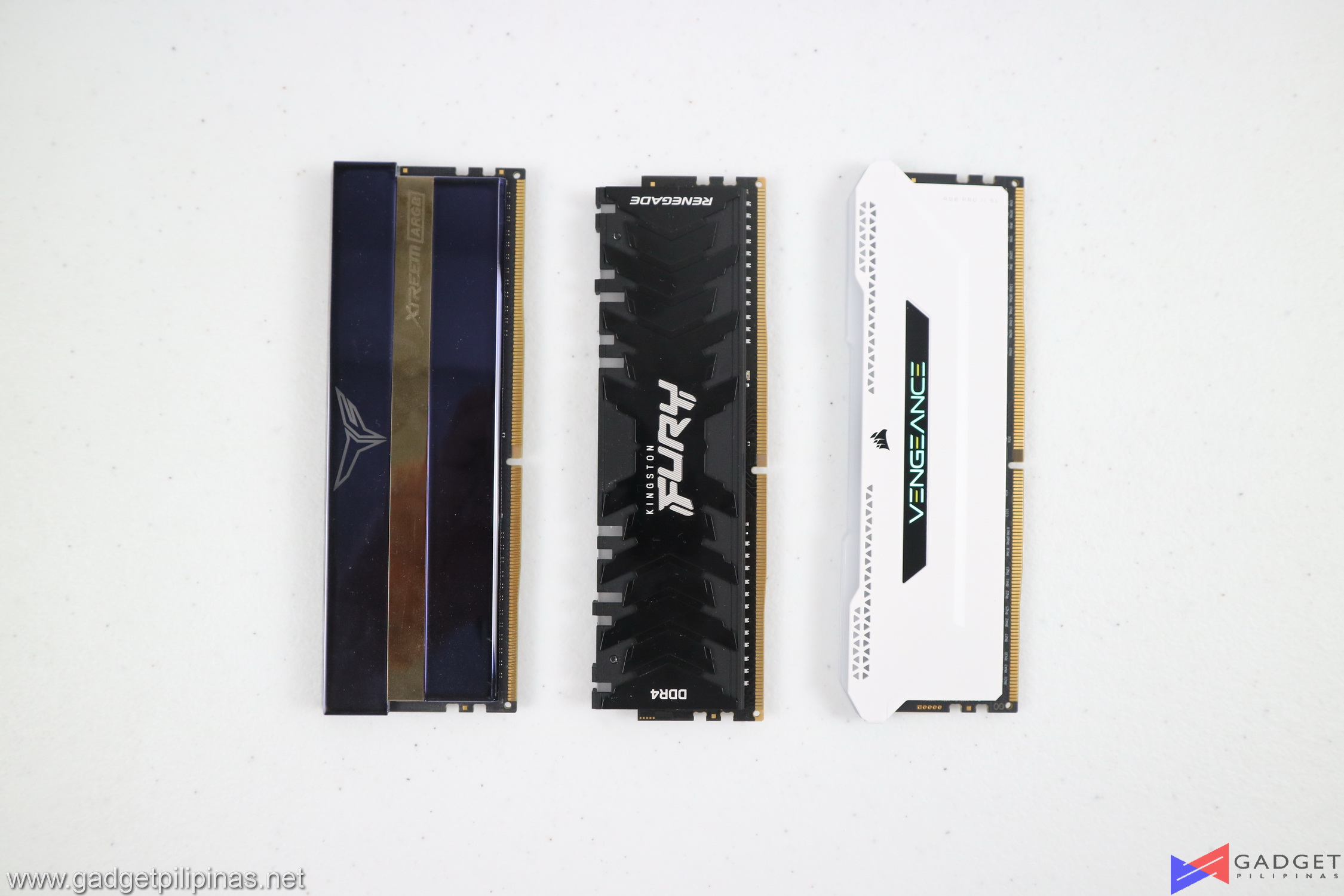 Despite its complicated design, the Kingston FURY Renegade is one of the shorter memory sticks with only a 42.2mm height and is definitely smaller than our TForce XTREEM and Corsair Vengeance Pro RGB SL modules. The FURY Renegade’s 133.35mm x 42.2 mm x 8.3 mm size could easily fit most ITX cases.
Despite its complicated design, the Kingston FURY Renegade is one of the shorter memory sticks with only a 42.2mm height and is definitely smaller than our TForce XTREEM and Corsair Vengeance Pro RGB SL modules. The FURY Renegade’s 133.35mm x 42.2 mm x 8.3 mm size could easily fit most ITX cases.
Benchmark Setup and Methodology
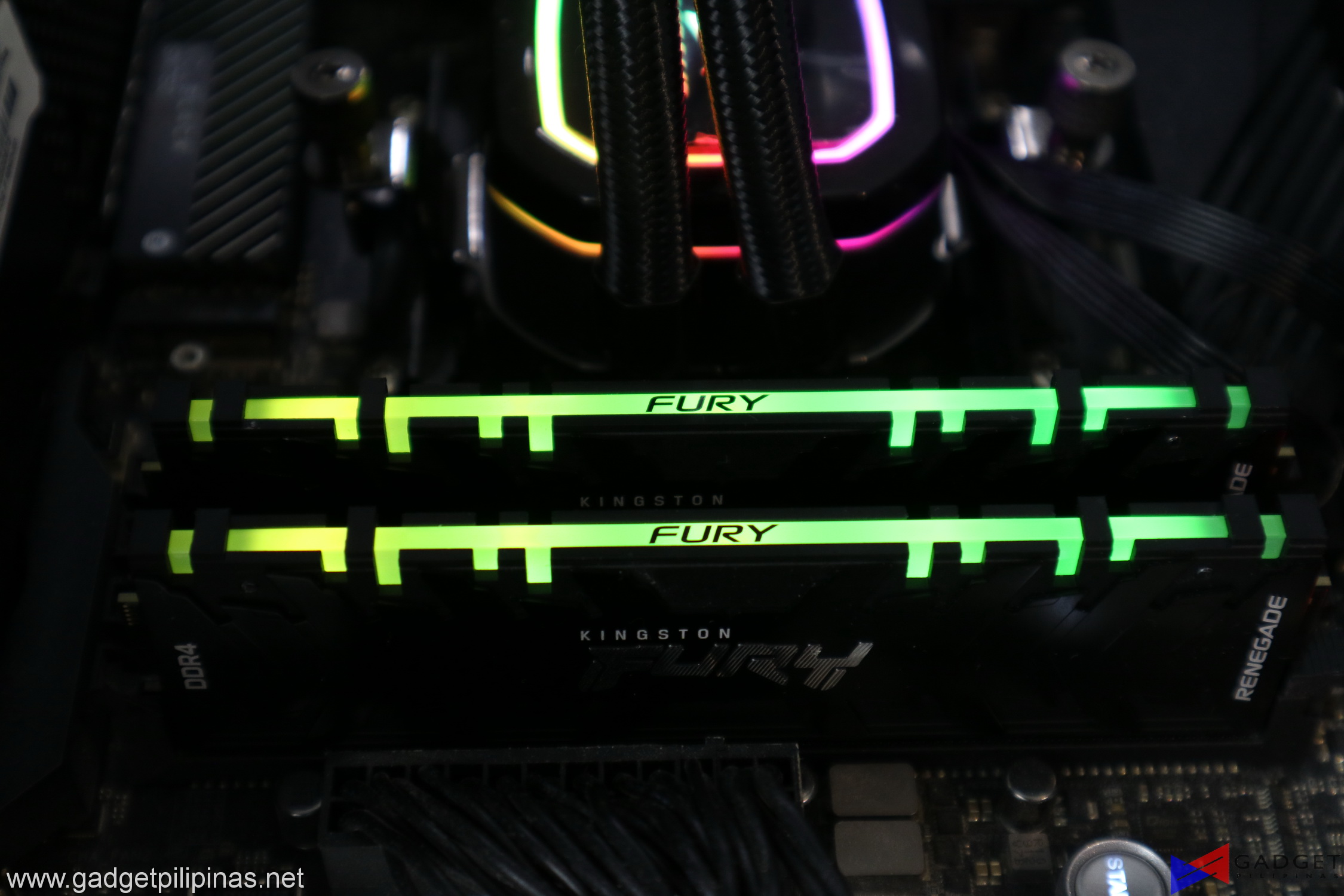 Gadget Pilipinas’ testing philosophy is to provide detail-oriented results as accurately as possible that our readers can replicate our tests given that these conditions are met. Different benchmarking apps and sequences are used depending on the component or device being tested.
Gadget Pilipinas’ testing philosophy is to provide detail-oriented results as accurately as possible that our readers can replicate our tests given that these conditions are met. Different benchmarking apps and sequences are used depending on the component or device being tested.
| Kingston FURY Renegade RGB Review Test Bench Specs | ||||||
| CPU | AMD Ryzen 9 5950X | |||||
| COOLER | Corsair H100i RGB PRO XT 240mm AIO – Noctua NT-H2 Thermal Paste | |||||
| MOTHERBOARD | ASUS ROG Crosshair VIII Hero (Wi-Fi) | |||||
| MEMORY | Tforce XTREEM ARGB 16GB(2x8GB) 3600Mhz DDR4 | Kingston FURY Renegade RGB 16GB(2x8GB) 4600Mhz DDR4 | Cosair Vengeance RGB Pro SL 16GB(2x8GB) 3200Mhz | |||
| GPU | Inno3D RTX 3080 Ti iChill X4 | |||||
| STORAGE | WD Black SN850 2TB SSD | |||||
| POWERSUPPLY | Seasonic Focus+ 850W GOLD | |||||
| OPERATING SYSTEM | Windows 10 Pro Build 2404 | |||||
| DISPLAY | Lenovo Legion Y27Q Gaming Monitor | |||||
We use CapFrameX 1.6.2 as our FPS capture and analysis tool for all our gaming benchmarks. The latest build version of Windows 10 and WHQL certified drivers are used for our benchmarks. Readings such as temperatures and power draw are recorded using HWMonitor, HWInfo64, and other relevant software for cross-checking.
For this review, we had to overclock the Ryzen 9 5950X’s Infinity Fabric clock to match the DDR4 speeds of the Kingston FURY Renegade 4600Mhz. Unfortunately, our 5950X only managed to clock at 1900Mhz which sets the optimal DDR4 speed at 3,800 Mhz. That said, we ran the Kingston Fury Renegade RGB 16GB kit at its XMP Setting of 4600Mhz with an Infinity Fabric clock at 1,900 Mhz. We still expect the improvements of having faster DDR4 speeds albeit almost negligible in some cases due to the decoupled speed with the Infinity Fabric clock.
Kingston FURY Renegade Benchmarks
SuperPI 32M
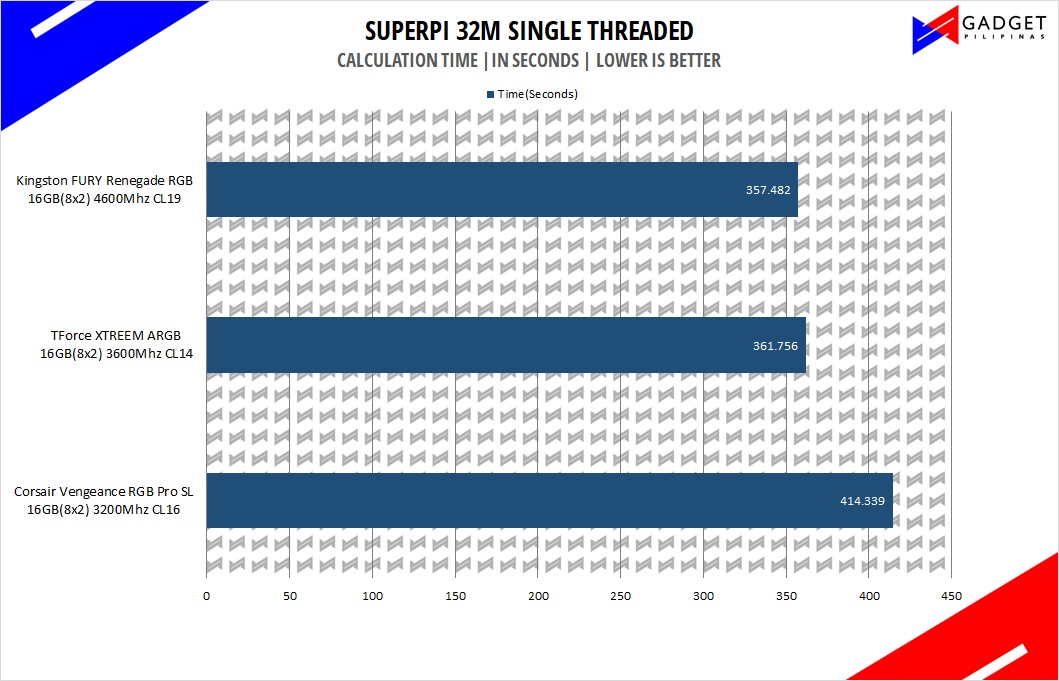 SuperPI is a single-threaded benchmark application that lets the CPU calculate Pi(π) to the nth digit. In this benchmark, we selected the Pi calculation to 32M, the highest available for the app.
SuperPI is a single-threaded benchmark application that lets the CPU calculate Pi(π) to the nth digit. In this benchmark, we selected the Pi calculation to 32M, the highest available for the app.
wPrime 1024M
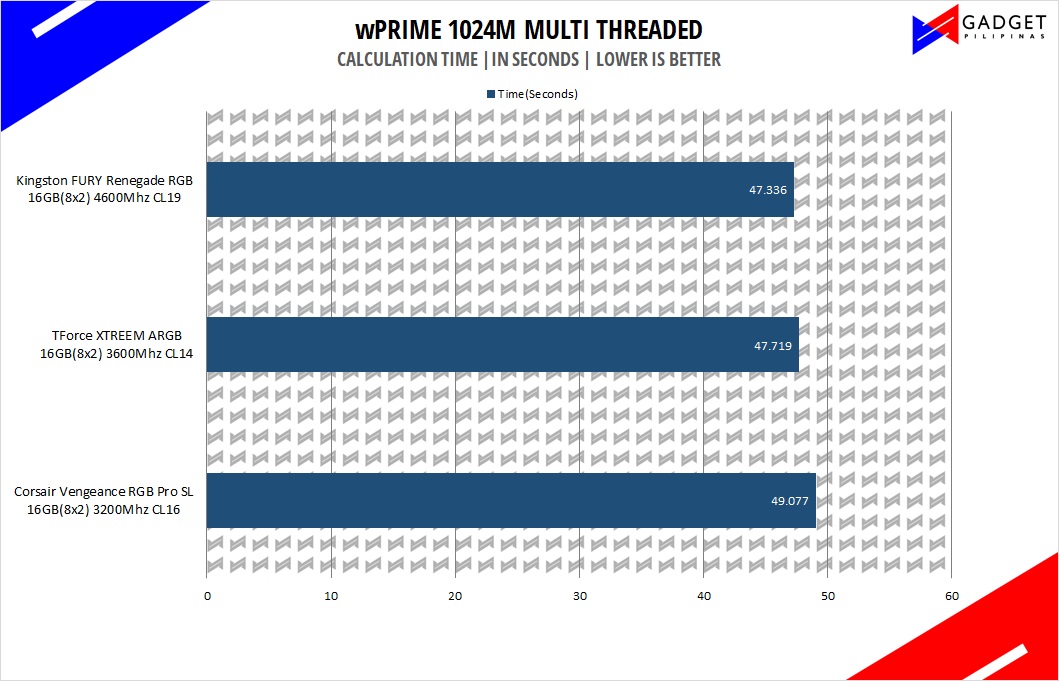 wPrime is a benchmark tool similar to SuperPI, but the former takes on finding prime numbers using Newton’s Method. The benchmark is set to calculate 1024 million prime numbers, and the performance is measured according to calculation time.
wPrime is a benchmark tool similar to SuperPI, but the former takes on finding prime numbers using Newton’s Method. The benchmark is set to calculate 1024 million prime numbers, and the performance is measured according to calculation time.
AIDA64 Memory Benchmark
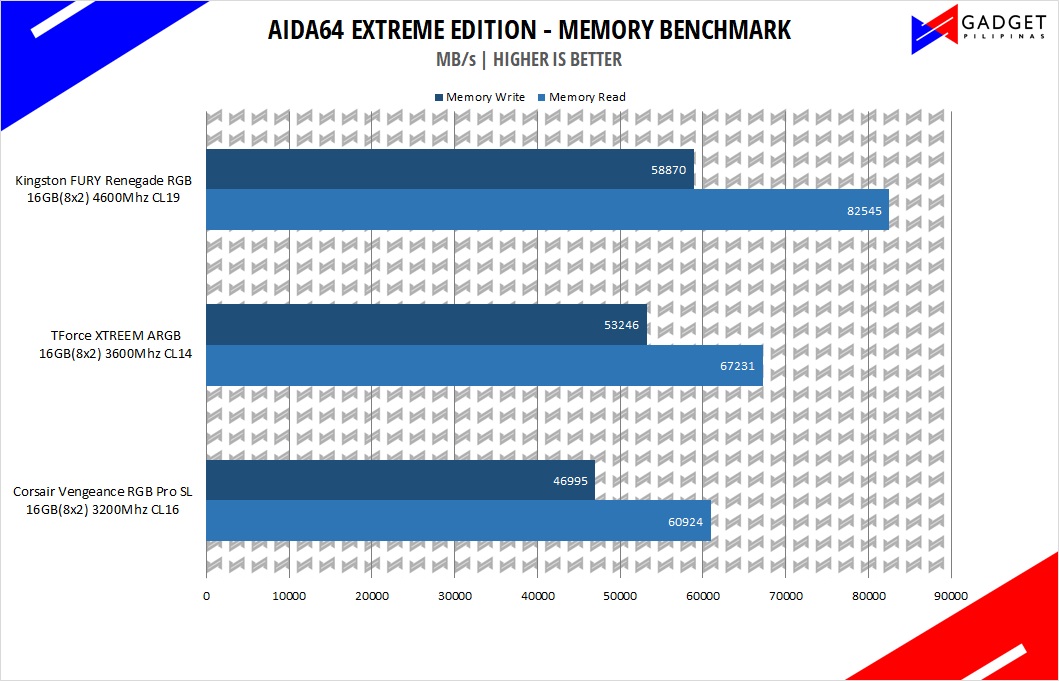 AIDA64 is a very popular and powerful monitoring tool, as well as a benchmarking application. AIDA64 is commonly used to stress test CPUs, especially testing if an overclock is stable. We used AIDA64’s Memory Benchmark to measure the data transfer bandwidth of the system memory.
AIDA64 is a very popular and powerful monitoring tool, as well as a benchmarking application. AIDA64 is commonly used to stress test CPUs, especially testing if an overclock is stable. We used AIDA64’s Memory Benchmark to measure the data transfer bandwidth of the system memory.
GeekBench 5
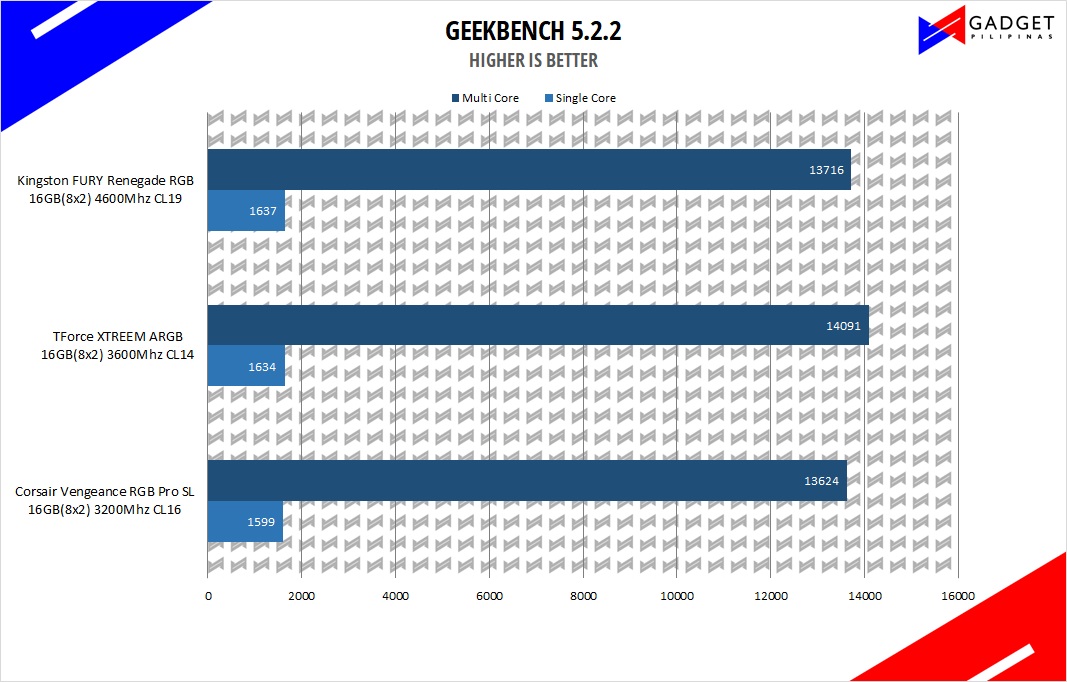 Geekbench is a multi-platform benchmark used to gauge CPU performance and compare them across Windows, Mac, and Mobile. Geekbench 5 is the latest version and doesn’t rely on memory than the previous Geekbench 4, making it a great tool to measure both single-core and multi-core CPU performance.
Geekbench is a multi-platform benchmark used to gauge CPU performance and compare them across Windows, Mac, and Mobile. Geekbench 5 is the latest version and doesn’t rely on memory than the previous Geekbench 4, making it a great tool to measure both single-core and multi-core CPU performance.
CINEBENCH R20
- Kingston FURY Renegade RGB 16GB DDR4 4600Mhz Review Cinebench R20 Benchmark 1
- Kingston FURY Renegade RGB 16GB DDR4 4600Mhz Review Cinebench R20 Benchmark 1
- Kingston FURY Renegade RGB 16GB DDR4 4600Mhz Review Cinebench R23 Benchmark 1
- Kingston FURY Renegade RGB 16GB DDR4 4600Mhz Review Cinebench R23 Benchmark 1
Maxon’s Cinebench benchmark is one of the most iconic benchmark applications used by reviewers and enthusiasts. The latest Cinebench R20 uses the latest rendering architectures, including Intel’s Embree ray tracing technology and other advanced features from AMD and Intel that allow users to render the same scene on the same hard. Cinebench R20 uses a larger and more complex testing scene than Cinebench R20 by about 8x computational power and requires 4x the memory.
GOOGLE OCTANE 2.0
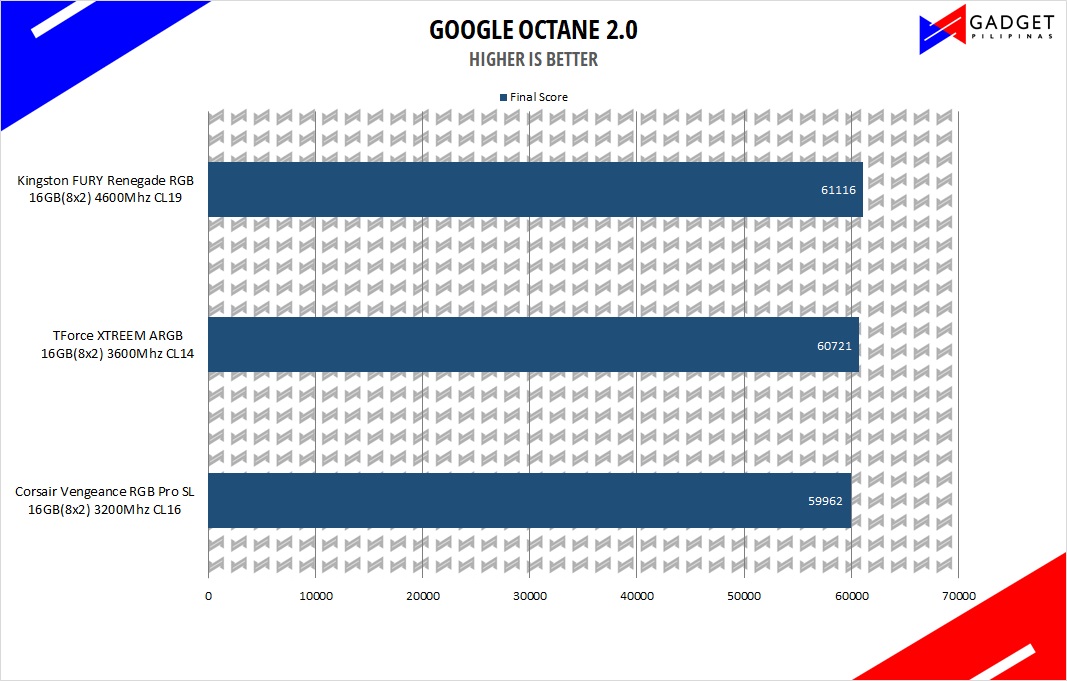 Google Octane 2.0 is a benchmark that measures a Javascript engine’s performance by running multiple tests representing different use cases of JavaScript applications. While Google Octane is retired and no longer maintained, it is still a good representation of today’s dynamic, interactive web applications. Our Google Octane 2.0 is run on Microsoft’s latest Chromium-based Edge browser.
Google Octane 2.0 is a benchmark that measures a Javascript engine’s performance by running multiple tests representing different use cases of JavaScript applications. While Google Octane is retired and no longer maintained, it is still a good representation of today’s dynamic, interactive web applications. Our Google Octane 2.0 is run on Microsoft’s latest Chromium-based Edge browser.
V-RAY
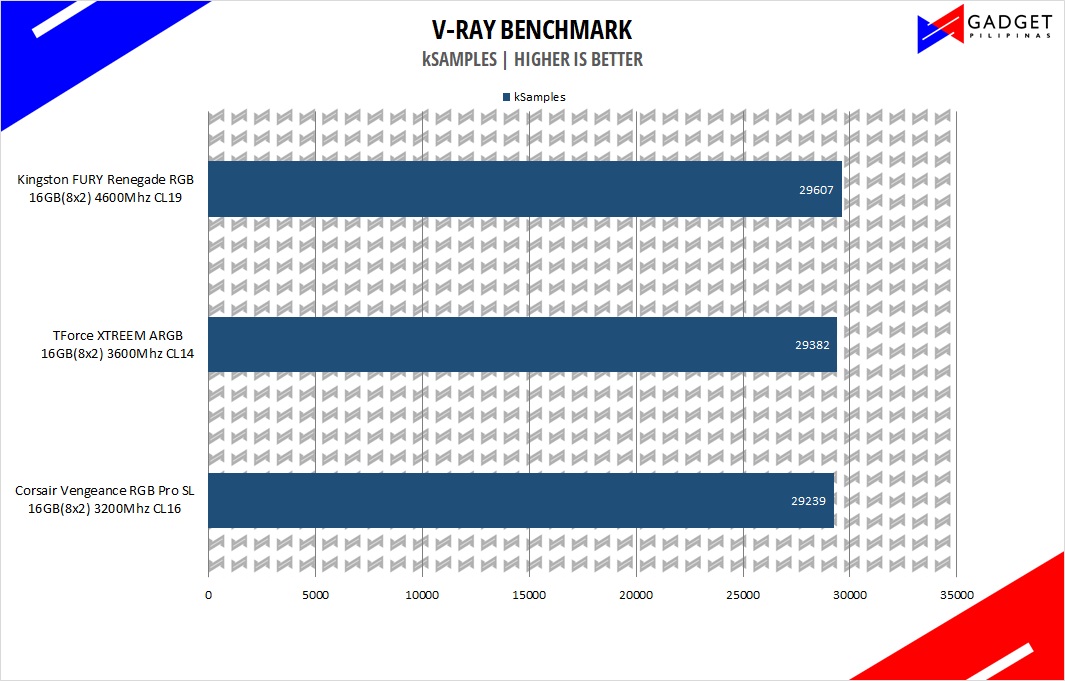 V-Ray Benchmark is a stand-alone version V-Ray developed by Chaos Group. It is designed to test the CPU and GPU by rendering sample scenes at a fixed amount of time. V-Ray is a plug-in mostly utilized by 3D computer graphics software applications mainly for industrial design, product design, architecture, film, and video game production. V-Ray is not limited to 64-threads as it supports multi and mega-threading.
V-Ray Benchmark is a stand-alone version V-Ray developed by Chaos Group. It is designed to test the CPU and GPU by rendering sample scenes at a fixed amount of time. V-Ray is a plug-in mostly utilized by 3D computer graphics software applications mainly for industrial design, product design, architecture, film, and video game production. V-Ray is not limited to 64-threads as it supports multi and mega-threading.
HANDBRAKE
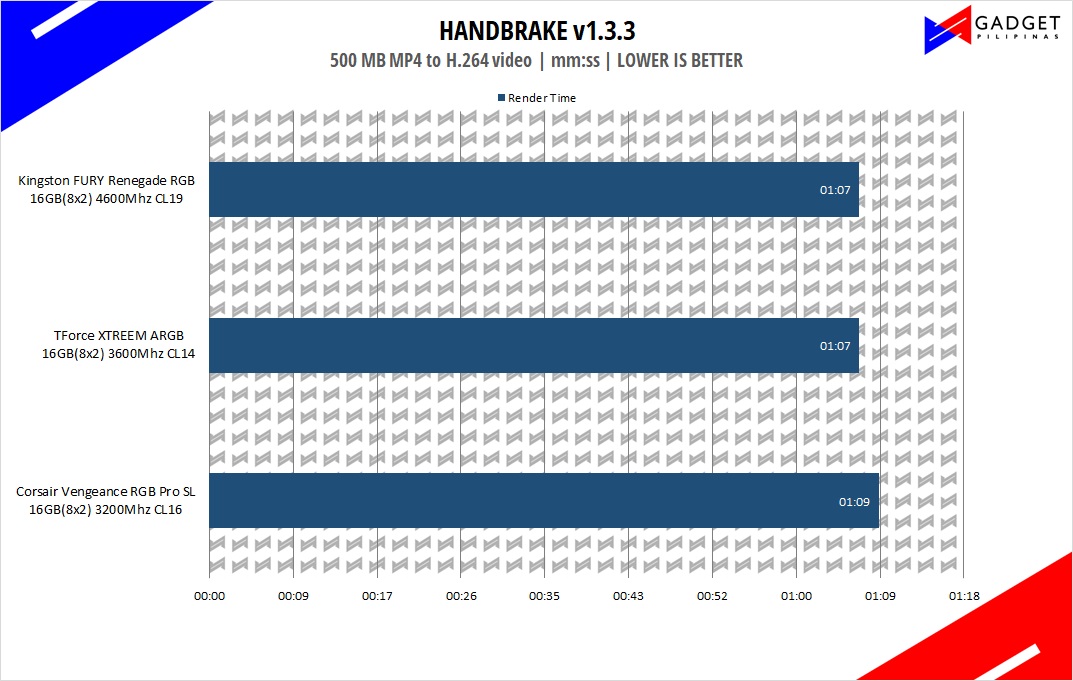 Handbrake is a top-rated open-source video conversion software that is used by professionals, enthusiasts, and even reviewers as a reference point mainly because of its wide variety of media codecs. The rise of streaming and blogging makes video content, both encoding, and transcoding important for these people, regardless if they’re seasoned professionals or just starting out. Handbrake also takes advantage of AVX-512 and OpenCL to accelerate certain types of media codecs. Our Handbrake benchmark converts a 500MB MP4 video to H.264 to measure the processor’s performance.
Handbrake is a top-rated open-source video conversion software that is used by professionals, enthusiasts, and even reviewers as a reference point mainly because of its wide variety of media codecs. The rise of streaming and blogging makes video content, both encoding, and transcoding important for these people, regardless if they’re seasoned professionals or just starting out. Handbrake also takes advantage of AVX-512 and OpenCL to accelerate certain types of media codecs. Our Handbrake benchmark converts a 500MB MP4 video to H.264 to measure the processor’s performance.
BLENDER
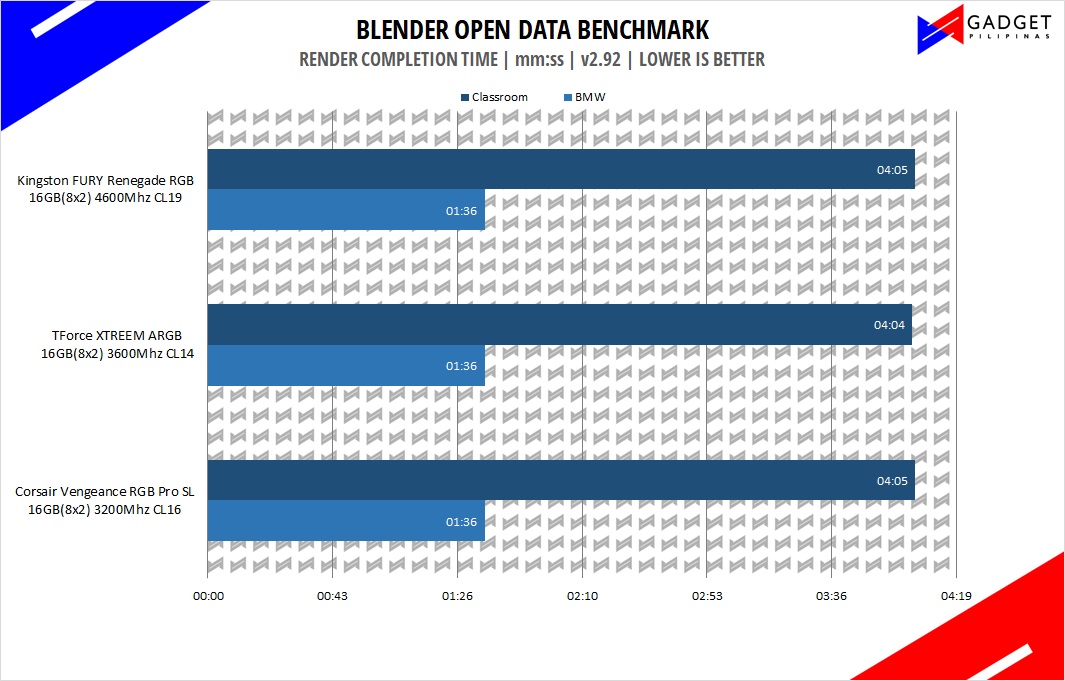 Blender is a widely used, free, open-source 3D creation suite. It supports the whole 3D pipeline process from modeling, rigging, animation, simulation, rendering, and even motion tracking. Blender has become a standard for CPU benchmarks with the BMW27 and Classroom scene most used. This prompted the company to release Blender Open Data Benchmark in 2018, a benchmark-specific version that allows users to run a preset benchmark and share the results online similar to 3D Mark.
Blender is a widely used, free, open-source 3D creation suite. It supports the whole 3D pipeline process from modeling, rigging, animation, simulation, rendering, and even motion tracking. Blender has become a standard for CPU benchmarks with the BMW27 and Classroom scene most used. This prompted the company to release Blender Open Data Benchmark in 2018, a benchmark-specific version that allows users to run a preset benchmark and share the results online similar to 3D Mark.
CORONA RENDERER
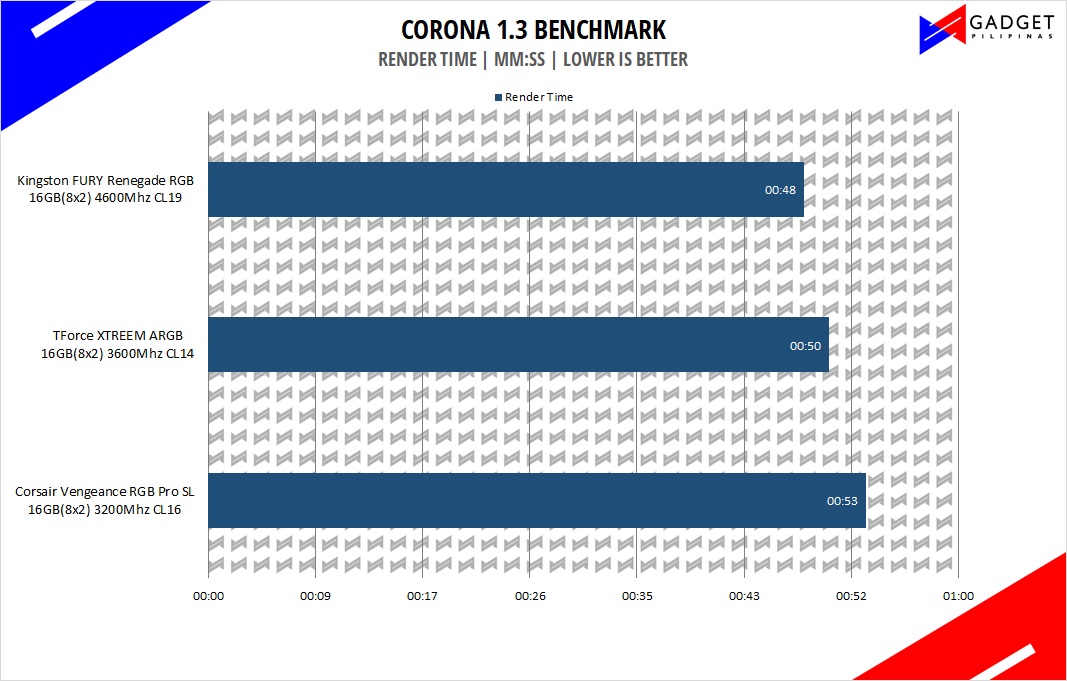 Corona Renderer is an unbiased photorealistic render available for Autodesk 3Ds Max, Maxon Cinema 4D, and as a stand-alone application. Its popularity, similar to Blender, led Chaos Group to develop a benchmark version of the app which runs using Corona Renderer 1.3. Workstation systems, especially CPUs, can utilize Corona Benchmark as up to 72 threads can be used in the benchmark, making it very suitable for CPUs with various price segments.
Corona Renderer is an unbiased photorealistic render available for Autodesk 3Ds Max, Maxon Cinema 4D, and as a stand-alone application. Its popularity, similar to Blender, led Chaos Group to develop a benchmark version of the app which runs using Corona Renderer 1.3. Workstation systems, especially CPUs, can utilize Corona Benchmark as up to 72 threads can be used in the benchmark, making it very suitable for CPUs with various price segments.
PCMark10
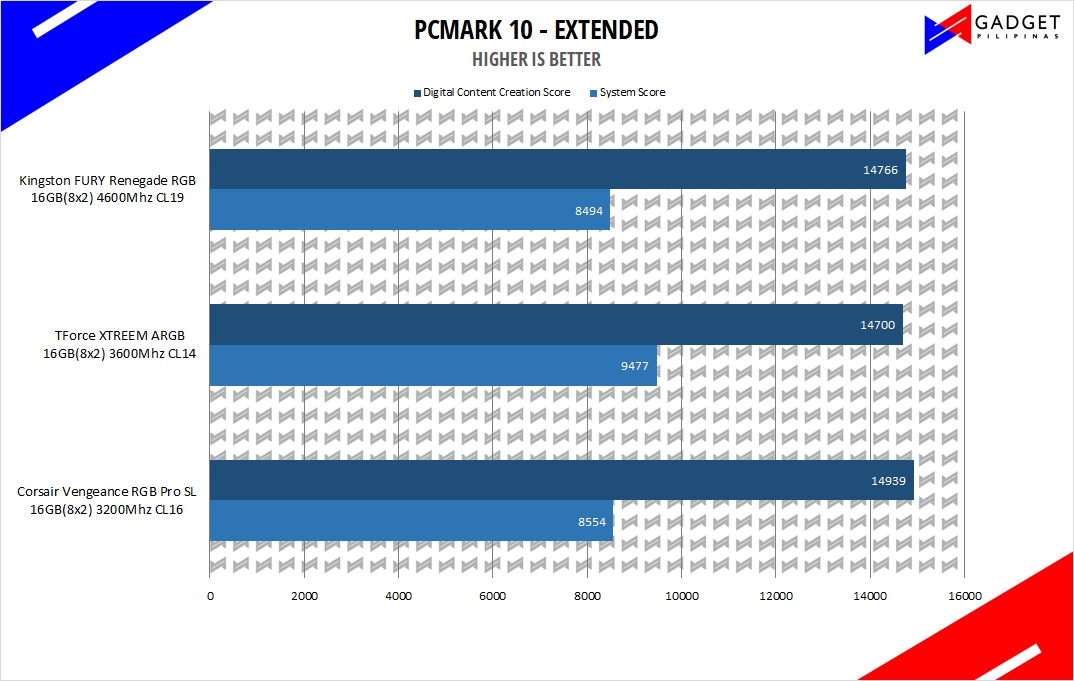 From the same developers of the popular game benchmarking tool 3DMark, PCMark 10 is a benchmarking app for measure a whole PC’s performance. It covers a wide variety of tests to reflect common tasks performed in a modern workplace. We selected PCMark 10’s extended benchmark and reported both the overall score and Digital Content Creation Score.
From the same developers of the popular game benchmarking tool 3DMark, PCMark 10 is a benchmarking app for measure a whole PC’s performance. It covers a wide variety of tests to reflect common tasks performed in a modern workplace. We selected PCMark 10’s extended benchmark and reported both the overall score and Digital Content Creation Score.
Counter Strike: Global Offensive
Final Thoughts
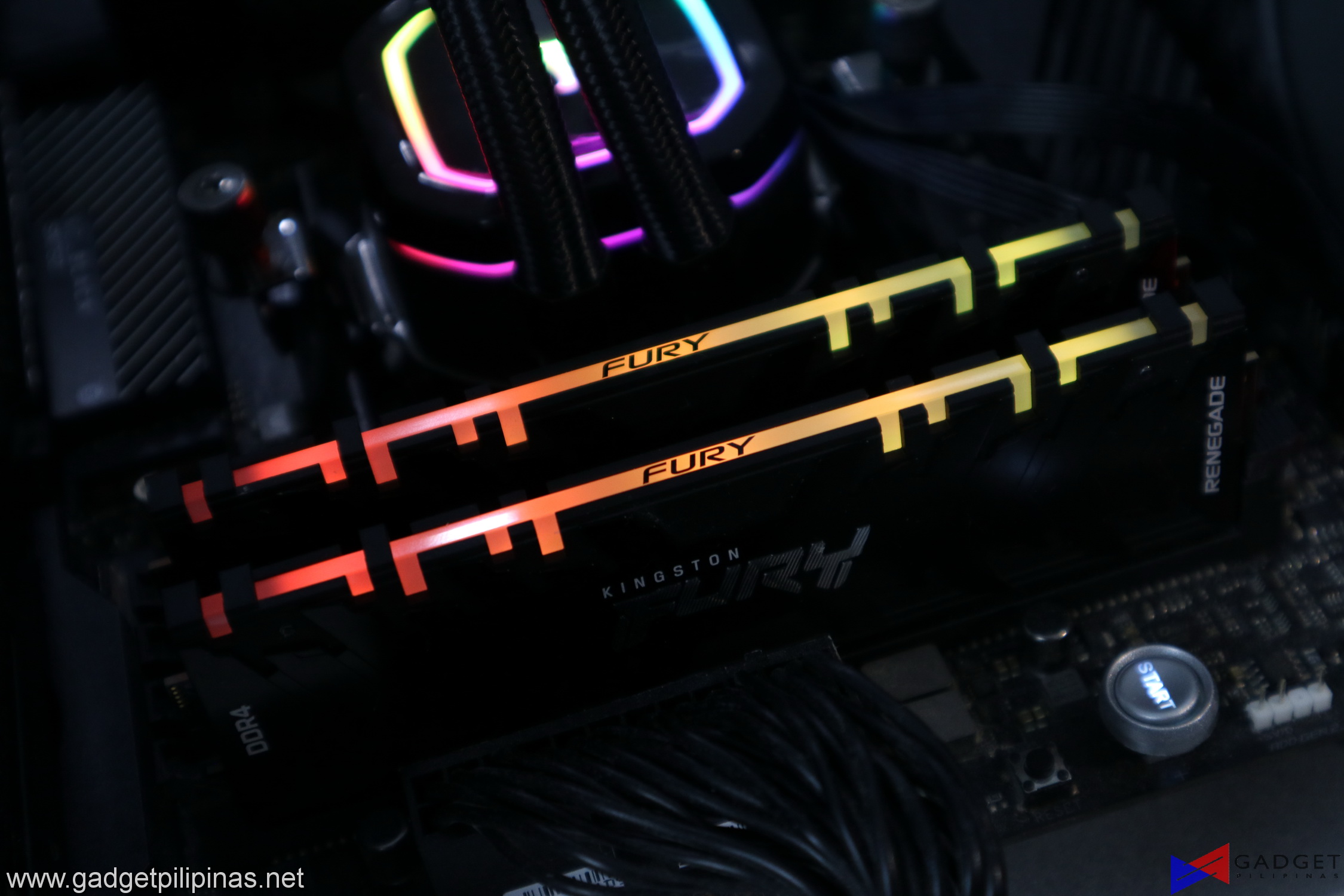 Despite the decoupled Infinity Fabric Clock, we still see performance improvements by going with a 4,600 Mhz kit from 3600 Mhz albeit with higher latency. In spite of that, the Kingston FURY Renegade RGB DDR4 4600Mhz provides decent performance especially if you’re running memory-intensive applications. That said, its price of roughly Php 7,000 is certainly not for everyone. And if we factor in AMD Ryzen 5000 series’ Infinity Fabric limitations, the niche becomes smaller. So, if you happen to be one of the few looking for a super-high-speed memory, then you won’t be disappointed with the Kingston FURY Renegade. The HyperX branding that we all know and love may be gone, but the quality and performance brought by Kingston’s 19-year experience are still there.
Despite the decoupled Infinity Fabric Clock, we still see performance improvements by going with a 4,600 Mhz kit from 3600 Mhz albeit with higher latency. In spite of that, the Kingston FURY Renegade RGB DDR4 4600Mhz provides decent performance especially if you’re running memory-intensive applications. That said, its price of roughly Php 7,000 is certainly not for everyone. And if we factor in AMD Ryzen 5000 series’ Infinity Fabric limitations, the niche becomes smaller. So, if you happen to be one of the few looking for a super-high-speed memory, then you won’t be disappointed with the Kingston FURY Renegade. The HyperX branding that we all know and love may be gone, but the quality and performance brought by Kingston’s 19-year experience are still there.
Grant is a Financial Management graduate from UST. His passion for gadgets and tech crossed him over in the industry where he could apply his knowledge as an enthusiast and in-depth analytic skills as a Finance Major. His passion allows him to earn at the same time help Gadget Pilipinas' readers in making smart, value-based decisions and purchases with his reviews and guides.

